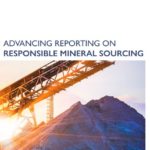
A draft EU regulation to prevent the minerals trade from funding conflict and human rights violations was approved by MEPs on Thursday. This “conflict minerals” law will oblige all but the smallest EU importers of tin, tungsten, tantalum, gold to do „due diligence” checks on their suppliers, and big manufacturers will also have to disclose how they plan to monitor their sources to comply with the rules.
“The new regulation has the potential to change the lives of people caught up in war. Our system, however, will only work on the ground if it stays flexible and all players involved learn continuously and act responsibly”, said rapporteur Iuliu Winkler (EPP, RO).
“We cannot turn a blind eye to the harm we cause in other parts of the world. These rules have laid the groundwork for an effective tool to break the link between conflicts, human rights abuses and our consumption of everyday goods”, International Trade Committee chair Bernd Lange (S&D, DE) added.
The draft regulation was approved by 558 votes to 17 with 45 abstentions.
Parliament wins mandatory checks for importers
MEPs persuaded EU ministers, in a November 2016 informal deal on the text, that due diligence checks, in accordance with OECD guidelines, should be mandatory for importers of tin, tungsten, tantalum and gold and their ores from conflict and high-risk areas. The Commission and Council had initially proposed only voluntary checks.
Authorities in EU member states will be responsible for ensuring compliance by companies. Recycled materials and small importers, such as dentists and jewellers, accounting for 5% of imports, will be exempted, so as not to impose unreasonable bureaucratic burdens.
EU manufacturers and sellers to disclose sourcing practices
In negotiations, Parliament also secured an undertaking that big EU firms (over 500 employees) that buy tin, tantalum, tungsten and gold to use in their products will be encouraged to report on their sourcing practices and will be able to join an EU registry.
High standards
The regulation stipulates that existing industry control schemes will be used in order to avoid double burdens, but Parliament ensured that these schemes will be checked regularly so as to maintain high standards that are consistent with OECD guidelines.
Review clause
The EU Commission will have to review the effectiveness of the new law regularly, covering both its impact on the ground and compliance by EU firms. It may also have to propose additional mandatory measures should the application of due diligence by companies prove unsatisfactory.
Next steps
Once the Council has approved the deal, it will be published in the EU Official Journal. Due diligence obligations will apply from 1 January 2021 to allow member states time to appoint competent authorities and importers to become familiar with their obligations.
Background
Mineral-rich countries afflicted by conflicts face a vicious circle in which revenue from illegally extracted resources feeds armed revolts. The regulation applies to all conflict-affected and high-risk areas in the world, of which the Democratic Republic of the Congo and the Great Lakes region are the most obvious examples. Experts will draw up a non-exhaustive list of areas, but country of origin is not the only indicator: information on transit or an irresponsible supplier should also prompt a background check.
Tin, tantalum, tungsten and gold are used in the production of many high-tech devices, in the automotive, electronics, aerospace, packaging, construction, lighting, industrial machinery and tooling industries, as well as in jewellery. “Due diligence” is defined by international OECD guidelines to help companies respect human rights and avoid contributing to conflict through their trade in minerals. Currently they have the status of recommendations.



